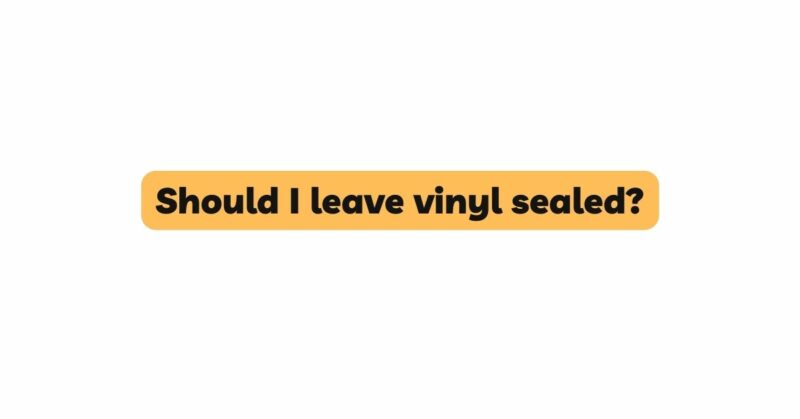The world of vinyl records is a realm where music enthusiasts, audiophiles, and collectors find a harmonious blend of nostalgia, artistry, and sonic experience. Among the myriad questions that arise for vinyl aficionados, the decision of whether to leave vinyl records sealed stands as a pivotal point of contention. This article seeks to explore the intricacies of this decision, examining the potential benefits and drawbacks of keeping vinyl records sealed, while guiding readers through the process of making an informed choice that aligns with their preferences and appreciation for music.
The Enigmatic Allure of Sealed Vinyl: Sealed vinyl records exude an aura of mystery and preservation. Encased in plastic, these records stand as time capsules, encapsulating the essence of their era and original condition. The allure of a pristine artifact, untarnished by time or human contact, captures the imagination of collectors, investors, and music enthusiasts alike. Yet, the decision to maintain a record’s sealed state or to unseal it carries significant implications, both practical and sentimental.
Advantages of Leaving Vinyl Records Sealed:
1. Preservation of Condition: Arguably the most prominent advantage of leaving vinyl records sealed is the preservation of their original condition. The cover art, inner sleeves, and the vinyl itself remain untouched by dust, light, and handling. This pristine state can be particularly appealing for collectors who value the visual and historical aspects of vinyl records.
2. Rarity and Investment Potential: Unopened vinyl records, especially those from limited pressings or special editions, can become rare commodities sought after by collectors. The scarcity of unopened copies can lead to increased market demand and potential investment value. Collectors who perceive vinyl records as both a passion and a potential financial asset might opt to keep records sealed to leverage this investment potential.
3. Cultural and Historical Significance: Sealed vinyl records encapsulate a snapshot of a specific era in music history. The packaging, labeling, and design reflect the artistic and cultural sensibilities of their time. Collectors who value the historical context of music might choose to maintain records in their sealed state as a testament to the bygone era they represent.
Considerations and Potential Drawbacks:
1. Sacrifice of Musical Experience: Vinyl records exist to be played and heard. Keeping records sealed prevents listeners from fully engaging with the auditory experience, depriving them of the warmth and depth of analog sound. The act of placing a vinyl record on the turntable, carefully dropping the needle, and immersing oneself in the sonic journey is an integral aspect of vinyl appreciation that is lost when records are kept sealed.
2. Limited Interaction with Artwork: Album artwork holds a unique significance in the world of vinyl records. Opening an album cover to explore the artwork, read liner notes, and engage with the visual experience is an intimate part of the vinyl ritual. Sealed records deny collectors the tactile connection to the cover art and the sense of discovery that accompanies it.
3. Potential Deterioration: Paradoxically, sealing vinyl records doesn’t guarantee their long-term preservation. The plastic shrink-wrap can degrade over time, potentially affecting the condition of the cover art and inner sleeves. Additionally, unopened records are not immune to environmental factors such as temperature fluctuations and humidity, which can impact the vinyl and packaging even in their sealed state.
Striking the Right Balance:
1. Reflecting Personal Connection: When grappling with the decision to leave a vinyl record sealed or to open it, consider your personal connection to music. If you prioritize the immersive sonic experience, tactile interaction, and emotional connection with the music, unsealing the record may be more aligned with your values.
2. Assessing Collectibility and Rarity: Different vinyl releases hold varying degrees of rarity and collectibility. Special editions, limited pressings, and albums of historical significance may carry more weight in terms of value if left sealed. Research the release’s market demand and rarity to inform your decision.
3. Responsible Storage and Handling: For collectors who choose to maintain vinyl records in their sealed state, proper storage is paramount. Store records vertically in a cool, dry environment, and consider using archival-quality plastic sleeves to mitigate potential degradation of the shrink-wrap.
Conclusion: The choice of whether to leave vinyl records sealed is a nuanced one, driven by individual motivations, preferences, and priorities. While sealed records offer the allure of preserving an artifact’s original condition and potential investment value, they come at the cost of missing out on the immersive musical experience and the tactile engagement with album artwork. Ultimately, the value of vinyl records extends beyond their physical state, encompassing the emotions, memories, and connections they foster with music and culture. Whether sealed or unsealed, each record holds a unique place in the heart of collectors, resonating with the diverse ways in which music enriches our lives.


